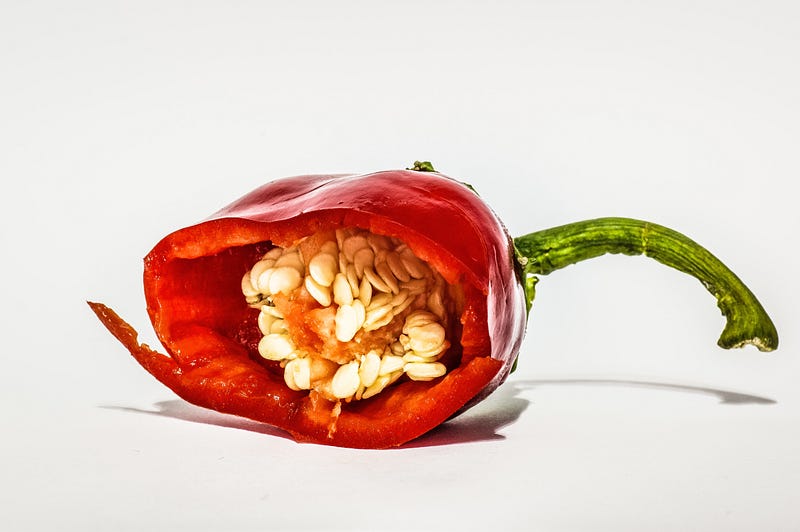The Fiery Evolution of Hot Peppers: Why Do They Hurt to Eat?
Written on
Chapter 1: The Mystery of Spicy Fruits
Have you ever pondered why certain fruits can be painful to consume? What causes that “hot” sensation, anyway?

If you happen to bite down on some pepper seeds, prepare for an explosion of heat. This raises an intriguing question: why would nature favor such an evolution? Growing up in the Midwest, I can attest to my limited exposure to spicy cuisine. My first visit to an authentic Thai restaurant left me in tears, chugging water like I was in a desert—there's a stark contrast between "Minnesota spicy" and genuine heat.
Now, I relish a hint of spice in my dishes, but I still tread carefully. Like many novice chefs, I've learned the hard way about not washing my hands after slicing a hot pepper. A few minutes later, a casual touch to my eye results in a painful awakening of redness and tears.
Capsaicin, the active compound in spicy foods, can be hazardous! It’s not surprising that pepper spray serves as an effective defense against assailants. Similarly, if you visit a gardening store, you'll find a capsaicin-infused powder designed to deter deer and rabbits from munching on your plants. Essentially, it’s just powdered cayenne pepper!
This raises a curious point. While capsaicin is beneficial for humans, why would plants produce a fruit that is painful to eat? After all, the primary goal of fruit is to be consumed.
The purpose of fruit is to attract animals that will eat it and subsequently disperse the seeds. This process helps in spreading the species by depositing seeds in new locations along with a dose of fertilizer.
Section 1.1: Reasons Behind Nature's Heat
As with many scientific inquiries, there are several theories about why pepper plants developed capsaicin.
#### Subsection 1.1.1: Birds and Capsaicin
One theory suggests that while spiciness deters mammals like us, it does not affect birds, who lack the receptors that perceive heat. This means that birds can consume chili peppers without discomfort. Interestingly, birds don’t have teeth, so they swallow the seeds whole, allowing them to pass through their digestive system intact—this is advantageous for the chili plant as it helps disperse seeds far from the parent plant.

But why wouldn't the plant want all animals to help spread its seeds? In regions where chilis grow, the primary mammals that might eat them are rodents, such as rats and mice. These creatures tend to crush seeds with their teeth, rendering them incapable of germination. For the chili plant, birds help propagate the seeds, while rodents destroy them.
Thus, capsaicin serves as a protective mechanism, enticing birds to feast while discouraging rodents.
Section 1.2: Capsaicin as a Microbial Defense
Another compelling reason for the evolution of capsaicin is its ability to fend off harmful insects and microbes. Research indicates that capsaicin levels can reduce the impact of parasitic insects, and plants that produce it tend to develop less mold and mildew.
However, producing capsaicin requires energy, which means not every plant will opt for this route. For many, the benefits of growth outweigh the need for a defense mechanism.
Chapter 2: The Human Connection to Spicy Foods
The first video, "How The World Became Spicy (In Only 20 Years)," explores the rapid increase in global spice consumption and its cultural significance.
The second video, "The Real Reason Peppers are Spicy," delves into the biological and evolutionary aspects of spicy foods and their effects on human taste.
Have you ever wondered why we enjoy the sensation of our mouths "burning"? The capsaicin in hot peppers activates our pain receptors, triggering a response similar to heat. This reaction is facilitated by a receptor known as TRPV1, which typically alerts our brain to actual heat.
While consuming hot peppers, our brains misinterpret the signal and react as if there’s real danger. Interestingly, in response to this pain, our brains release endorphins to dull the discomfort. This evolutionary trait helps distract us from genuine pain, allowing us to escape potential threats.
So, why do we enjoy this sensation? The endorphin rush that follows the initial discomfort is similar to the "runner's high," making spicy foods pleasurable despite their initial pain.
In conclusion, peppers have evolved their spiciness to protect their seeds from unwanted consumers while appealing to birds that help with seed dispersal. Humans, in turn, have embraced this evolutionary trait, breeding peppers to enhance their spiciness, ensuring their survival in our diets.
Wasn’t this discussion enlightening? For more fascinating scientific insights, be sure to subscribe to Sharing Science!
Sharing Science
Observations and analysis from a Silicon Valley microbiome scientist on bacteria, biotech, and scientific career…